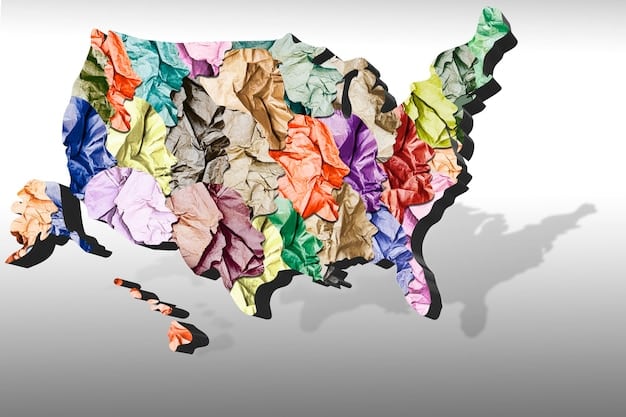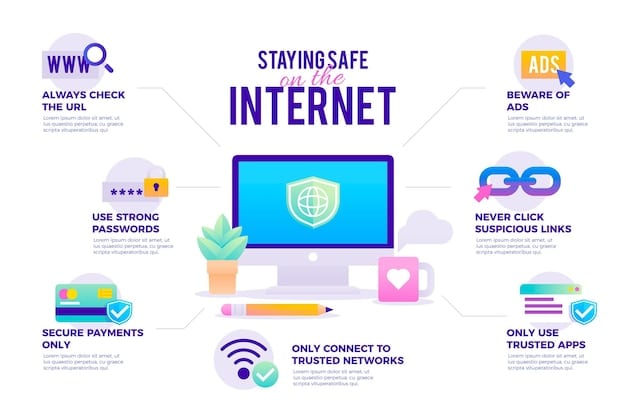Unlocking Regional Streaming: Your US Viewing Guide

Unlocking Hidden Content: The Ultimate Guide to Regional Streaming Libraries in the US unveils how streaming services vary content based on location, offering ways to access a wider selection of movies and shows.
Ever noticed how your friend in another state seems to have a better selection of movies and shows on their streaming service? You’re not imagining things! Unlocking Hidden Content: The Ultimate Guide to Regional Streaming Libraries in the US delves into the fascinating world of regional content variations and how you can access a broader range of entertainment.
Understanding Regional Streaming Variations
Streaming services often tailor their content libraries based on geographical location. This means that what you can watch in California might be different from what’s available in New York. Understanding why this happens is the first step to expanding your streaming horizons.
Why Does Regional Content Vary?
Several factors contribute to these regional differences. Licensing agreements, content popularity, and legal requirements all play a role in shaping what’s available in each area.
Licensing agreements are a primary driver. Streaming services must obtain the rights to distribute content in specific regions. These agreements can be complex and may not always cover the entire country. Content popularity also factors in. If a particular show or movie is more popular in one region than another, the streaming service may prioritize its availability in that area. Finally, local laws and regulations can also impact content availability.
For instance, a streaming service might have secured the rights to stream a particular movie in the Northeast but not in the Southwest due to different distribution deals. Alternatively, a documentary about a local historical event might be heavily promoted in the region where the event took place, while being less prominently featured elsewhere.
- Licensing Agreements: Distribution rights vary by region.
- Content Popularity: Demand dictates availability.
- Legal Requirements: Compliance with local laws.

In conclusion, regional content variations are a complex interplay of licensing, demand, and legal considerations. Understanding these factors allows you to be more strategic in accessing the content you want, regardless of your location.
Leveraging VPNs to Access Geo-Restricted Content
Virtual Private Networks (VPNs) offer a way to bypass these regional restrictions. By routing your internet traffic through a server in a different location, you can appear to be accessing the streaming service from that region, potentially unlocking new content.
How VPNs Work
VPNs create a secure, encrypted connection between your device and a remote server. This not only masks your IP address but also encrypts your data, providing an added layer of security and privacy.
When you connect to a VPN server in, say, Atlanta, Georgia, your internet traffic is routed through that server. To the streaming service, it appears as though you’re accessing their platform from Atlanta, even if you’re physically located in Seattle, Washington. This can grant you access to content libraries that are normally exclusive to users in that region. However, it’s important to choose a reputable VPN provider with servers in the regions you want to access.
Selecting a suitable VPN involves researching various providers, comparing their server locations, connection speeds, and security features. Some VPNs are specifically designed for streaming, offering optimized connections for seamless viewing. Also, be aware that streaming platforms actively try to detect and block VPN usage, so it’s crucial to choose a VPN that can effectively bypass these restrictions.
- Secure Connection: Encrypted data transfer.
- IP Masking: Hiding your actual location.
- Server Selection: Choose a server location strategically.
In conclusion, VPNs are a powerful tool for accessing geo-restricted content, but careful selection and awareness of potential limitations are crucial for a successful streaming experience.
Choosing the Right VPN for Streaming
Not all VPNs are created equal, especially when it comes to streaming. Factors like server speed, reliability, and the ability to bypass geo-restrictions are crucial when making your selection.
Key Considerations for VPN Selection
Look for VPNs with a large network of servers, fast connection speeds, and strong encryption. It’s also important to choose a VPN that has a proven track record of bypassing geo-restrictions on popular streaming platforms.
A wide server network means you have more options for connecting to different regions. Fast connection speeds are essential for smooth, buffer-free streaming. Look for VPNs that offer unlimited bandwidth and optimized servers for streaming. Strong encryption ensures your data remains secure and private. Read reviews and testimonials from other users to get an idea of the VPN’s performance and reliability.
Consider features like a kill switch, which automatically disconnects your internet connection if the VPN drops, preventing your actual IP address from being exposed. Some VPNs also offer specialized streaming servers that are optimized for bypassing geo-restrictions. Free VPNs should generally be avoided, as they often have limitations on bandwidth, speed, and server locations. They may also collect and sell your data.
- Server Network: Wide range of locations.
- Connection Speed: Fast and reliable streaming.
- Encryption: Secure data protection.

In summary, selecting the right VPN for streaming requires careful consideration of server network, connection speed, encryption, and user reviews. Choosing a reliable and well-reviewed VPN will ensure a seamless and secure streaming experience.
Exploring Smart DNS Proxies as Alternatives to VPNs
Smart DNS proxies offer another method for accessing region-locked content. Unlike VPNs, they don’t encrypt your traffic but instead redirect only the parts of your connection that reveal your location.
How Smart DNS Proxies Differ from VPNs
Smart DNS proxies are generally faster than VPNs because they don’t encrypt your data. However, they also don’t offer the same level of security and privacy as a VPN.
Smart DNS proxies work by rerouting specific DNS requests that reveal your location. This allows you to access content from different regions without affecting your overall internet speed. Some devices, like smart TVs and gaming consoles, may not support VPNs, making Smart DNS proxies a viable alternative. However, it’s important to note that Smart DNS proxies only bypass geo-restrictions and don’t provide encryption or IP masking like VPNs do.
Setting up a Smart DNS proxy typically involves configuring your device’s DNS settings to use the proxy’s servers. This can be more complex than setting up a VPN, but many Smart DNS providers offer detailed instructions for various devices. Smart DNS proxies are generally more effective at bypassing geo-restrictions than VPNs because they are specifically designed for this purpose. However, they are not as versatile as VPNs, as they don’t offer the same level of security and privacy.
- Faster Speed: No data encryption.
- Specific Redirection: Only location-revealing connections are redirected.
- Device Compatibility: Works on devices that don’t support VPNs.
In conclusion, Smart DNS proxies are a faster but less secure alternative to VPNs for accessing region-locked content. They are particularly useful for devices that don’t support VPNs, but users should be aware of the trade-offs in terms of security and privacy.
Legal and Ethical Considerations of Bypassing Geo-Restrictions
While accessing region-locked content using VPNs or Smart DNS proxies is technically possible, it’s important to consider the legal and ethical implications.
Understanding the Terms of Service
Most streaming services have terms of service that prohibit the use of VPNs or other methods to bypass geo-restrictions. Violating these terms could result in account suspension or termination.
Streaming services often include clauses in their terms of service that restrict access to content based on geographic location. By using a VPN or Smart DNS proxy to bypass these restrictions, you are technically violating the agreement you made with the streaming service when you signed up. While it’s unlikely that you’ll face legal consequences, your account could be suspended or terminated if the streaming service detects your VPN usage.
From an ethical standpoint, some argue that accessing content from other regions is unfair to content creators and distributors who have licensed their content for specific territories. Others argue that consumers should have the right to access content regardless of their location, especially if they are paying for a subscription. Ultimately, the decision of whether or not to bypass geo-restrictions is a personal one, but it’s important to be aware of the potential consequences and the ethical considerations involved.
- Terms of Service: Know the rules.
- Potential Consequences: Account suspension.
- Ethical Considerations: Fairness to content creators.
In summary, bypassing geo-restrictions using VPNs or Smart DNS proxies raises legal and ethical questions. While it may be tempting to access content from other regions, it’s important to understand the potential consequences and the ethical implications involved before doing so.
Alternative Methods to Discover New Content
Beyond VPNs and Smart DNS, there are other, more conventional ways to find new movies and shows worth watching. Exploring these options can expand your viewing horizons without resorting to geo-spoofing.
Utilizing Streaming Service Recommendations
Most streaming platforms have built-in recommendation algorithms that suggest content based on your viewing history. These algorithms can often surface hidden gems you might otherwise miss.
Streaming services continually refine their recommendation algorithms to better understand your preferences. By analyzing your watch history, ratings, and searches, these algorithms can suggest movies and shows that align with your tastes. Don’t dismiss these recommendations; they can often lead you to discover hidden gems you might not have found on your own. Actively rate the content you watch to help the algorithms learn your preferences more accurately.
Consider exploring different genres and categories within the streaming platform to broaden your viewing horizons. Many streaming services create curated collections and themed lists that highlight specific types of content. Utilizing these resources can help you discover new and interesting movies and shows that you might not have considered otherwise. Social media platforms and online forums dedicated to streaming can also be valuable sources for finding recommendations from other viewers.
- Recommendation Algorithms: Personalized suggestions.
- Curated Collections: Themed content lists.
- Social Media: Recommendations from other viewers.
In conclusion, exploring streaming service recommendations, curated collections, and social media discussions can lead to discovering new content without needing to rely on VPNs or Smart DNS proxies. These readily available tools can help expand your viewing options and ensure you don’t miss out on hidden gems.
| Key Point | Brief Description |
|---|---|
| 🌍 Regional Content | Streaming libraries vary by US region. |
| 🛡️ VPNs | Mask location, access geo-restricted content. |
| 🚀 Smart DNS | Faster, redirects location data only. |
| ✅ Recommendations | Explore built-in suggestions and curated lists. |
FAQ
▼
Content licensing agreements vary by geographic area. What’s available in California might not be in New York due to different distribution deals.
▼
A VPN masks your IP address, making it appear as though you’re browsing from a different location. This can unlock content restricted to that region.
▼
It’s generally not illegal, but it may violate the terms of service of the streaming platform, potentially leading to account suspension.
▼
A Smart DNS proxy redirects only the parts of your connection that reveal your location, without encrypting your data. It’s faster but less secure than a VPN.
▼
Yes! Explore streaming service recommendations, curated collections, and social media discussions to discover new movies and series.
Conclusion
Unlocking Hidden Content: The Ultimate Guide to Regional Streaming Libraries in the US has explored the ins and outs of accessing geographically restricted content on streaming services, from leveraging VPNs and Smart DNS proxies to understanding the ethical considerations and utilizing alternative discovery methods. By understanding the landscape, you can make informed choices to expand your streaming horizons and access a wider range of entertainment.





